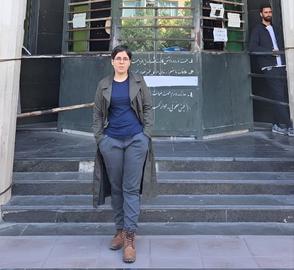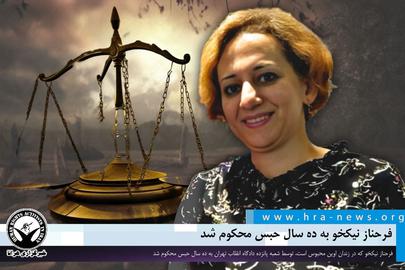Farnoush Faridbod is an assistant professor at the Center of Excellence in Electrochemistry at Tehran University’s Faculty of Chemistry and one of Iran’s youngest research chemists. In 2018, Clarivate Analytics named her among the world’s top one percent of scientists who have the highest number of citations in peer-reviewed journals.
Faridbod, who was born on March 21, 1980, studied chemistry at Al-Zahra University before pursuing her postgraduate studies in analytical chemistry at Tehran University, where she obtained her PhD in 2009.
"Faridbod is one of the most peaceful and proficient professors in the School of Chemistry, and although there is little age difference between her and her students, she can manage her classes well,” A chemistry student at Tehran University told IranWire. “In fact, her classes have the highest number of participants in the Tehran University’s School of Chemistry."
Faridbod has told her students that she dreamt about becoming a researcher since early childhood. She always thought she would become a research physician and work in the field of human diseases.
In an interview with Tasnim news agency, Faridbod spoke of the favorable conditions her family provided for her to fulfill her aspirations.
"Our family environment was very peaceful,” Faridbod said. “My parents sacrificed their enjoyment and trips for me and my other two sisters. Their main priority was for their children to have peace of mind and be successful. My mother was a hygienist and my father loved sports. Paying attention to all these details provided a favorable environment for us. I began taking gymnastics lessons when I was five and practiced swimming since fifth grade. I always participated in physical strength competitions and won the top medal in this field in Tehran province. I also won several medals in swimming."
By inventing an advanced device for measuring the blood sugar level in diabetics using their saliva, Faridbod offered patients a non-invasive diagnostic tool.
In a documentary produced by Mehdi Bakhshi-Moghaddam, titled “I am an Iranian,” Faridbod says she had received proposals from other countries asking permission to produce this small blood glucose monitoring device, but she preferred to produce it in her own country.
Faridbod says that her parents had diabetes and she always empathized with the pain felt by patients who had to use a glucometer. That is why she sought to create a new non-invasive diagnostic device with the support of her teachers, Mohammad Reza Ganjali and Kambiz Larijani.
"This diagnostic tool for diabetes was first designed and manufactured in the Center of Excellence in Electrochemistry of Tehran University,” she says. “...it is a painless and cheap method, without any need for complicated operations, making it easy to use by even uneducated and disabled patients."
Faridbod, who won numerous awards inside Iran, was ranked the country's top scientist in the 12th Ibn Sina (Avicenna) Festival.
In an interview about how she began her research work, Faridbod explains: "In fact I began my research work while still studying for my master’s degree, when I was working as a typist for my teachers and their articles. At that time computers were just getting popular and I was rather fond of using them. In the second trimester, a seminar was held at the university and they were looking for a typist. I was very good at English too. I would read the articles, edit and type them. In other words, I have seen the research work and the writings of other researchers. After the third year, I began to pursue research work by taking a course in practical research. At that time, we were making solvents in the laboratory...It was in those years that the spark of research ignited in me. I loved and still love games, particularly strategic games. Writing articles was like a new game for me. At that time, I did not write many articles, but those I wrote were cited widely."
Faridbod is also highly-ranked in the Thomson Reuters Institute for Scientific Information database. Also, she was previously the head of Iran's Diabetes Research Center.
In 2004, as part of the student exchange program of Tehran University, Faridbod went to Germany to attend additional research courses. The trip was a new opportunity to learn, but she has never imagined living anywhere outside Iran.
In the documentary “I am an Iranian,” she says that traveling in Germany and witnessing the country's advanced scientific infrastructure was a precious experience for her. Not only did she become acquainted with German scientific circles, but also with German culture.
Faridbod regards order, planning, and having a clear goal as the reasons for her success, and she wishes to bring these scientific good practices closer to reality in Iran.
Today, Faridbod is teaching the same class she took as a student. She heads Tehran University’s chemistry laboratory, working to upgrade it for her students while remembering her chair in the corner of the lab during her student years.
Faridbod loves cultivating flowers and plants and wants to spend her retirement cultivating them. Considering her age, however, she still has a long way to go before that happens.
visit the accountability section
In this section of Iran Wire, you can contact the officials and launch your campaign for various problems

























comments